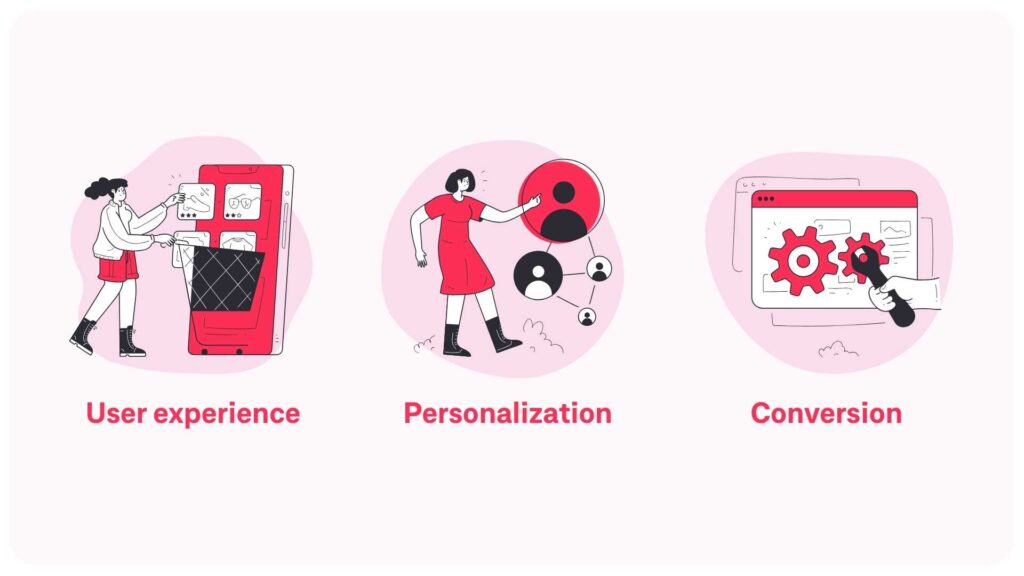In the AI race, one sphere emerges as the ultimate prize: search. With Google, Microsoft, Baidu, and others incorporating AI advancements it became obvious: AI is changing the way we search online. But is the spill-over effect notable in the e-commerce space?
To start you off with some numbers, AI in e-commerce is likely to reach $16.8 billion by 2030. Additionally, AI is expected to manage 80% of customer interactions. Now, consider the fact that for B2B commerce, a stunning 92% of purchases start with a search… It’s notable, to say the least.
Aside from data though, there’s a special charm to the good, old “We’ve tried it, it works.” Especially if it comes when it’s first-hand.
Well, we’ve tried it. It works.
Here are the benefits we’ve observed that all e-commerce brands can gain from using AI search. Basics first, though…
What is AI-powered search?
An AI search algorithm understands what you type into a search box and finds the best results. It’s like having an extra brain for online shopping, making search quick and easy.
Unlike regular keyword searches, AI search predicts the meaning of your query and grasps synonyms, just like a person would. It looks at your preferences, dives into product details, and works its magic to suggest things that make you click ‘buy’ faster. This beats traditional search – it’s way faster and simpler.
3 Benefits of Using AI-powered Search

Benefit #1: Improved Shopper’s Experience
Providing exact word-for-word results can make users want to leave. You make a typo, for instance, and the results come up empty. It’s not just that shoppers leave, however; In 2024 it’s so disappointing it makes a lot of people feel like never (ever) coming back.
Why you may wonder?
Well, there are lots of other options. Options that, among other things, care about users.
Put yourself in the user’s shoes for a second and think about time-saving. As you type, the engine finishes your thoughts and suggests spot-on auto-complete. Source of relief, right? The AI’s ability to think like a human means you spend less time playing Scrabble while shopping.
Moreover, imagine results not just throwing everything at you. Instead AI predicts your intent, serving the most important results first. That saves a click, or two, or three, right there. Aside from better result accuracy, it may also lend you a hand in finding new items you need as well.
Benefit #2: Personalized Suggestions
Here’s the scoop: AI algorithms can take note of what products users are eyeing, tossing into the cart, and finally, buying. When this clickstream data is blended with search, the search results get a custom touch for each user.
For instance, picture this: a shopper grabs the latest Nike shoe and then punches in “waterproof shoe cover” in the search bar. Guess what? The results get smart, pushing up covers for his shoe type to the top. The algorithm noticed the buyer’s new choice in sneakers and it served him the exact cover he was looking for.
Now, compare that to a traditional non-predictive search. If you did a basic keyword-based search for “waterproof cover,” you might end up with generic results that don’t have a clue you just bought Nike. Large retail suppliers would serve you with random stuff: cellphone plastic seals, waterproof tents, tarp covers, addidas shoe covers, and whatnot. Before you can think of the exact product name, if you’re lucky, somewhere on page 20 you may find your shoe covers.
We hope by now it’s clear. AI search is a world of difference from the word-for-word approach of traditional searches.
Benefit #3: Spike In Conversions
In the online game, more competition often means coughing up more cash for clicks and ads. It’s the name of the game. But, do all the nitty gritty to turn more existing visitors into actual customers, and boom – you earn more and don’t spend as much.
And what simplifies this challenge? AI-based conversion strategies – including AI search.
Imagine if the user came with the intention to buy, clicked through a website without any hiccups, and found what he wanted. Would he buy?
Probably yes and AI site search steps in to increase these odds by a big margin. Just remember that a notable portion of users go directly to the search bar upon visiting your website. If you have more usability issues across your store, fixing search will probably be a good first move. Users who feel like circumventing navigating your website will want a good escape route – and that has traditionally been search. If search slacks, well, your shoppers may get frustrated.
Get this right, and users stick around, explore products, and, you guessed it, hit that ‘Buy’ button a lot more.
Net Group’s AI-powered Search Engine for Invaru

Invaru’s success story came to fruition thanks to the introduction of a smart search. This upgrade gave a new life to the online store, making it a breeze for customers to discover products swiftly and accurately, significantly elevating their shopping experience.
How did we pull it off? By using and modifying an off-the-shelf artificial intelligence solution, Klevu AI.
Klevu AI took things up a notch for Invaru, seamlessly connecting shoppers with the exact products they’re after. It’s like having a shopping buddy that just gets you. By sharing shopper intent data throughout the product discovery journey: Customers get personalized suggestions, they love their experience, and the conversion rates increase.
Closing Thoughts
AI searches are impacting the e-commerce. With the projected growth in AI-driven e-commerce solutions by 2030, the influence is unmistakable. AI search, like Net Group’s collaboration with Invaru, not only positions them one step ahead of the competition but also makes their customers feel like staying around.
Buying should be a smooth experience. In quest for that, we’re glad to see more e-commerce brands taking a step in the right direction.
Similar insights

Inside Europe’s Cybersecurity Skill Shortage in 2026
17/02/2026
Which Software Development Process Is Best for Your Company?
10/02/2026
How To Know If Your Business Is Ready To Scale Internationally
21/01/2026
8 Hybrid Commerce Mistakes Companies Repeat in 2026
13/01/2026
Smart Workflows: AI Tools and Tips for Busy Leaders
16/12/2025
Supply Chain Attacks: Rethinking Third-Party Trust
10/12/2025
Choosing the Right Tech Stack in Uncertain Times
25/11/2025
How to Pitch and Get Your Ideas Approved at Work
12/11/2025
12 AI Cyberattacks That Made CEOs Very Cautious
21/10/2025
Let the success
journey begin
Our goal is to help take your organization to new heights of success through innovative digital solutions. Let us work together to turn your dreams into reality.